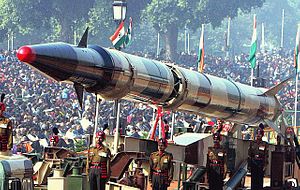India’s nuclear status-quo is a conundrum: Should it be legitimized, and if so, why? This ongoing argument is sowing discord within the international non-proliferation regime.
Recently, India reaffirmed its fundamental position on the non-proliferation treaty (NPT): New Delhi will not join the NPT as a non-nuclear weapons state. It is, however, prepared to enter into bilateral or multilateral agreements with pledges of no-first-use and no-attack against non-nuclear weapons states, as stated by Ambassador D. B. Venkatesh Varma on October 21. This has provoked debate: Does the situation benefit India or does the advantage remain with non-nuclear weapons parties in the regime? And can a middle ground be reached that safeguards the NPT regime, and introduces pathways to non-member states like India.
Whether or not they are part of the NPT, all states are part of the dilemma. Is it better to encourage India’s approach to reducing the risk of using nuclear weapons by accepting its position? On the positive side, India’s compliance with the no-first-use pledge may encourage it to avoid nuclear adventurism. If this is accepted by the NPT member states, it could increase the effectiveness and reduce the risk of nuclear weapons being used at times of war. The next question, then, is whether one can trust India.
It is worth noting that New Delhi has attempted to contribute to the nuclear non-proliferation regime by voluntarily keeping clear records and proposing an ideal method of global nuclear disarmament. India has been strongly in favor of universal, non-discriminatory, and verifiable disarmament processes since its proposed 1982 resolution. On this basis, New Delhi’s perspectives on the NPT have established a firm foundation: India is willing to postpone its membership application until it is accepted as a nuclear weapons state. In the meantime, New Delhi has fulfilled its requirements by creating a space for nuclear commerce through Indo-U.S. nuclear deals, thereby demonstrating its progressive stance as an exceptional de-facto nuclear weapons state.
The agreement suggested by New Delhi regarding no-first-use would effectively prevent full-scale nuclear warfare. If all non-NPT nuclear weapons states were to follow India’s example in the future, then it would have to be acknowledged that India’s suggestion is a practical means of lessening the nuclear peril. As many have suggested, if keeping nuclear weapons is an inevitable military strategy, then proposals from the non-NPT nuclear weapons states may be useful. Irrespective of the controversy surrounding what India claims to be the discriminatory nature of the NPT regime, bilateral and multilateral agreements on no-first-use against non-nuclear weapons states will pressure the nuclear weapons party states to be risk averse. In addition, the 1988 India-Pakistan bilateral non-attack agreement is an attempt to avoid creating a regional nuclear flashpoint, and to reduce the risk of nuclear warfare it could be expanded to encompass regional NPT signatories like Afghanistan, Bangladesh, Nepal and Sri Lanka.
On the other hand, India’s unilateral action is cause for grave concern – not because of doubts about its effectiveness, but because of a potential negative chain reaction among other de facto nuclear weapons states. Since the late 1960s, after the NPT regime was created, attempts to eliminate the loophole in the regime have proven ineffective. It is clear that any exceptions can be viewed as a weakness in the regime. Thus, India’s suggested agreement could provide the legal cover for non-NPT nuclear weapons states to change the spirit of the regime. If a bilateral agreement is made outside the NPT, the merits of the international non-proliferation regime become blurred: Non-nuclear states in the NPT may complain or use leverage against the P-5 (UN Security Council permanent members), such as asking for increased membership advantages. At the same time, the de facto nuclear weapons states outside the NPT may seek similar approaches that would grant them political and legal rights. The most serious concern here is that the regime, the ultimate goal of which is nuclear non-proliferation and disarmament, may be dealt with separately.
For instance, if North Korea were to propose an agreement that was then accepted by non-nuclear weapons states of the NPT, Pyongyang may hold the legal position of being a nuclear weapons state as a result of the agreement. This legitimization of nuclear weapons status would bring a range of advantages, both political and military. Definitions as well as terms and conditions used to clarify the final agreement between party states may lead to misuse of the agreement. Logically, it is likely to be used to increase nuclear capability against adversarial nuclear weapons states after gaining legitimacy outside the NPT. Since these states are pursuing a credible deterrence, agreements with non-nuclear weapons states may be a useful tool for legitimizing their position to match other nuclear weapons states’ capabilities, rather than promising not to launch nuclear attacks on non-nuclear weapons states.
Similarly, to what extent is the agreement proposed by New Delhi relevant in cases of extended deterrence? States that have deployed nuclear weapons in alliance systems always receive attention concerning how long the extended deterrence will last. If an agreement enters into force between nuclear weapons states and non-nuclear weapons states which host deployed warheads, the situation may become untenable regarding nuclear proxy wars. In other words, the agreement is valid between the two state parties, yet the question is whether nuclear weapons deployed in non-nuclear weapons states will be used when the two nuclear weapons states are at war.
Approaching the 2015 NPT Review Conference, there are considerable expectations surrounding India’s new government and NPT membership. New Delhi’s desire to transform policy into practice by signing the agreement looks valid in a regional context; however, India should be more cautious when moving forward in reading the global context.
Ji Yeon-jung is a lecturer at Hankuk University of Foreign Studies (HUFS), Seoul, South Korea.
































